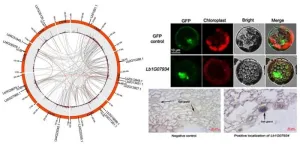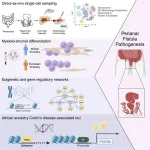(Press-News.org) In 2022, an estimated 249 million malaria cases killed 608,000 people in 85 countries worldwide including the United States, according to the World Health Organization.
Malaria continues to pose a considerable public health risk in tropical and subtropical areas, where it impacts human health and economic progress.
Despite concerns about the potential impact of climate change on increasing malaria risk, there is still limited understanding of how temperature affects malaria transmission – until now.
Malaria is a mosquito-borne disease caused by a parasite that spreads from bites of infected female Anopheles mosquitoes. If left untreated in humans, malaria can cause severe symptoms, health complications and even death.
In tropical and subtropical regions where malaria is prevalent, scientists are concerned that climate warming might increase the risk of malaria transmission in certain areas and contribute to further spread. However, there is still much to learn about the relationship between temperature and the mosquito and parasite traits that influence malaria transmission.
In “Estimating the effects of temperature on transmission of the human malaria parasite, Plasmodium falciparum,” a groundbreaking study published in the journal Nature Communications, researchers at the University of Florida, Pennsylvania State University and Imperial College, combined novel experimental data within an innovative modeling framework to examine how temperature might affect transmission risk in different environments in Africa.
“In broad terms, scientists know that temperature affects key traits such as mosquito longevity, the time it takes for a mosquito to become infectious after feeding on an infected host, and the overall ability of the mosquito to transmit the disease“ said Matthew Thomas, a UF/IFAS professor and UF/IFAS Invasion Science Research Institute (ISRI) director. “But what might seem surprising is that these temperature dependencies have not been properly measured for any of the primary malaria vectors in Africa”.
“Our findings provide novel insights into the effects of temperature on the ability of Anopheles gambiae mosquitoes -- arguably the most important malaria mosquito in Africa -- to transmit Plasmodium falciparum, the most prevalent species of human malaria in Africa,” said Eunho Suh, joint first-author with Isaac Stopard at Imperial College, and assistant research professor at Penn State, who conducted the empirical research as a post-doctoral student in Thomas’ previous lab.
The study involved several detailed laboratory experiments in which hundreds of mosquitoes were fed with Plasmodium falciparum-infected blood and then exposed at different temperatures to examine the progress of infection and development rate within the mosquitoes, as well as the survival of the mosquitoes themselves.
“The novel data were then used to explore the implications of temperature on malaria transmission potential across four locations in Kenya that represent diverse current environments with different intensities of baseline transmission, and that are predicted to experience different patterns of warming under climate change,” explained Thomas.
The study supports previous research results in demonstrating that various mosquito and parasite traits exhibit intermittent relationships with temperature and that under future warming temperatures, transmission potential is likely to increase in some environments but could reduce in others. However, the new data suggest that parasites can develop more quickly at cooler temperatures and that the rate of parasite development might be less sensitive to changes in temperature, than previously thought.
The data also indicate that the successful development of parasites in the mosquito, declines at thermal extremes, contributing to the upper and lower environmental bounds for transmission.
Combining these results into a simple transmission model suggests that contrary to earlier predictions, the anticipated surge in malaria transmission, attributed to climate warming, may be less severe than feared, particularly in cooler regions like the Kenyan Highlands.
“Some of the current assumptions on mosquito ecology and malaria transmission derive from work done in the early part of the last century. Our study is significant in highlighting the need to revisit some of this conventional understanding,” said Thomas.
“While the time it takes for a mosquito to become infectious is strongly dependent on environmental temperature, it also depends on the species and possibly strain of malaria and mosquito,” said Suh.
The comprehensive study and findings represent a significant step forward in understanding the intricacies of malaria transmission and paves the way for future research aimed at controlling malaria on a global scale.
“Our work focused on the malaria parasite Plasmodium falciparum in the African malaria vector, Anopheles gambiae. However, Plasmodium vivax is another important parasite species responsible for most malaria in Asia, as well as the recently reported malaria cases in the U.S.,” said Suh. “Like Plasmodium falciparum, the established model describing the effects of temperature on development of Plasmodium vivax remains poorly validated.”
The same is true for other vector-borne diseases, such as dengue or Zika virus, added Suh.
“We need more work of the type we present in the current paper, ideally using local mosquito and parasite or pathogen strains, to better understand the effects of climate and climate change on transmission risk,” he said.
END
Can climate change accelerate transmission of malaria? Pioneering research sheds light on impacts of temperature
2024-04-24
ELSE PRESS RELEASES FROM THIS DATE:
A new attempt to identify salt gland development and salt resistance genes of Limonium bicolor ——Identification of bHLH gene family and its function analysis in salt gland development
2024-04-24
The secondary salinization of saline-alkali land is increasing globally. It is of strategic significance to explore the salt-tolerant molecular mechanism of halophytes and cultivate saline-alkali resistant crops for the improvement of saline-alkali land. The recretohalophyte Limonium bicolor has a unique salt-secreting structure, salt gland, which can directly excrete Na+ out of the body to effectively avoid salt stress. Exploring the development mechanism of salt gland structure in recretohalophyte is of great significance for analyzing the development of plant epidermis structure and improving the salt-resistant mechanism of plants.
Recently, Wang ...
The SAPIENS Podcast named finalist at the 16th Annual Shorty Awards
2024-04-24
SAPIENS: A Podcast for Everything Human has been named as a 16th Annual Shorty Awards finalist in the Science and Technology Podcast Category.
The Shorty Awards honor the best work in digital and social media by the most creative and influential brands, agencies, organizations, and individuals whose work has excelled in creativity, strategy, and effectiveness.
SAPIENS’s work has demonstrated outstanding performance across the judging criteria, which makes it a top contender for a Shorty Award in a most competitive year. The work is also eligible for ...
Startup financing gender gaps greater in societies where women are more empowered
2024-04-24
Commercial bankers provide capital to fund the operations and growth of businesses. However, as these lenders evaluate entrepreneurs who apply for loans, gender bias leads to women being denied more often than their male counterparts.
Estimates show a $1.7 trillion financing gap worldwide for small- and medium-sized enterprises owned by women.
Studies show that when women do secure business loans, the amounts tend to be smaller, have higher interest rates and require more collateral, which restricts the economic potential of women-led ventures. However, findings ...
Postpartum depression after adolescent stress shows a dysregulated HPA axis: a cross-species translational study
2024-04-24
BIRMINGHAM, Ala. – Adverse life events are a known and predominant risk factor for postpartum depression in women after delivery of their baby. Furthermore, the postpartum depression in women who have experienced adverse life events tends to be refractory to treatment.
In a study using a mouse model and human subjects, researchers from the University of Alabama at Birmingham and Johns Hopkins Medicine show that stress from adolescent social isolation in mice elicits a prolonged elevation of corticosterone levels and glucocorticoid signaling, which in turn results ...
When studies conflict: building a decision-support system for clinicians
2024-04-24
One day you hear that red wine is good for your heart. The next day, it’s not. The same goes for chocolate. And coffee. The see-saw of contradicting information isn’t anything new, but what happens when clinicians hear conflicting studies about a medication they use for their patients? Researchers at the Perelman School of Medicine at the University of Pennsylvania are hoping to use, among other methods, a variety of artificial intelligence to help sort that out.
Ellen Caniglia, ScD, an assistant professor of Epidemiology and Enrique Schisterman, PhD, a professor and the chair of the Department of Biostatistics, Epidemiology, and Informatics (DBEI), ...
Artificial sweetener has potential to damage gut
2024-04-24
New research has discovered that neotame, one of the new generation of artificial sweeteners, is capable of damaging the human intestine and causing illness.
The study is the first to show that neotame can cause previously healthy gut bacteria to become diseased and invade the gut wall – potentially leading to health issues including irritable bowel syndrome and sepsis – and also cause a breakdown of the epithelial barrier, which forms part of the gut wall.
The research, which is published in the journal Frontiers in Nutrition and was carried out at Anglia Ruskin ...
Gene-based therapy restores cellular development and function in brain cells from people with Timothy syndrome
2024-04-24
In a proof-of-concept study, researchers demonstrated the effectiveness of a potential new therapy for Timothy syndrome, an often life-threatening and rare genetic disorder that affects a wide range of bodily systems, leading to severe cardiac, neurological, and psychiatric symptoms as well as physical differences such as webbed fingers and toes. The treatment restored typical cellular function in 3D structures created from cells of people with Timothy syndrome, known as organoids, which can mimic the function of cells ...
MD Anderson Research Highlights for April 24, 2024
2024-04-24
HOUSTON ― The University of Texas MD Anderson Cancer Center’s Research Highlights showcases the latest breakthroughs in cancer care, research and prevention. These advances are made possible through seamless collaboration between MD Anderson’s world-leading clinicians and scientists, bringing discoveries from the lab to the clinic and back.
Recent developments at MD Anderson offer insights into a novel targeted therapy for rare cancers, the role of enhancer RNAs in cell differentiation, novel biomarkers for the prognosis and treatment of pancreatic cancer, imaging signatures to stratify ...
Child pedestrians, self-driving vehicles: What’s the safest scenario for crossing the road?
2024-04-24
Crossing a busy street safely typically is a result of a social exchange. Pedestrians look for cues—a wave, a head nod, a winking flash of the headlights, and, of course, a full vehicle stop—to know it’s safe to cross.
But those clues could be absent or different with self-driving vehicles. How will children and adults know when it’s safe to cross the road?
In a new study, University of Iowa researchers investigated how pre-teenage children determined when it was safe to cross a residential street with oncoming self-driving cars. The researchers found children made the ...
Mount Sinai researchers the first to apply single-cell analysis to reveal mechanisms of a common complication of Crohn’s disease
2024-04-24
Mount Sinai researchers have published the first study to use single-cell analysis in identifying several pathophysiological mechanisms of abnormal passageways in the digestive system known as perianal fistulae, a common complication of Crohn’s disease. These findings were published in the journal Med on April 24.
Crohn’s disease is an inflammatory bowel disease that causes chronic inflammation at any part of the gastrointestinal (GI) tract and impacts more than half a million people in the United States. Perianal fistulae, abnormal connections between the anal canal and perianal skin, are a common complication of Crohn’s disease that often result in ...






